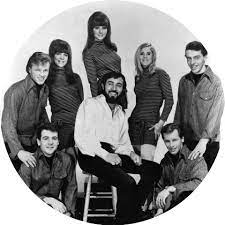
Sam the Sham produced a large and influential number of garage rock songs in the 60s and 70s that helped define the genre and undermined the idea he was just a novelty act
Sam the Sham and the Pharaohs

Sam the Sham produced a large and influential number of garage rock songs in the 60s and
70s that helped define the genre and undermined the idea he was just a novelty act
![]()
| Original Members: Domingo "Sam" Sumdio Carl Miedke Russell Flower Omar Lopez Vincent Lopez |
Domingo "Sam" Samudio Ray Sinnett David Martin Butch Gibson Jerry Patterson |
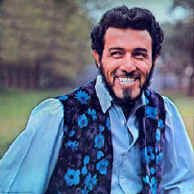
Domingo "Sam" Samudio was born March 6, 1937 in Dallas, Texas, better known by his stage name Sam the Sham. As the front man for the Pharaohs, he sang on several Top 40 hits in the mid-1960s, including "Wooly Bully" and "Li'l Red Riding Hood".
Samudio made his singing debut in second grade, representing his school in a radio broadcast. Later, he took up guitar and formed a group with friends, one of whom was Trini Lopez. After graduating from high school, Samudio joined the Navy. He lived in Panama for six years, until his discharge.
Back in the States, Samudio enrolled in college, studying voice at Arlington State College, now the University of Texas at Arlington.
In Dallas in 1961, Sam formed The Pharaohs, the name inspired from the costumes in Yul Brynner's portrayal as pharaoh in the 1956 film The Ten Commandments. The other members of The Pharaohs were Carl Miedke, Russell Fowler, Omar Lopez, and Vincent Lopez. In 1962, the group made a record that did not sell and later disbanded.
In May 1963, Vincent Lopez was playing for Andy and the Nightriders in Louisiana. When their organist quit, Sam joined. Andy and the Nightriders were Andy Anderson, David A. Martin, Vincent Lopez, and Sam. The Nightriders became house band at The Congo Club, near Leesville, Louisiana. It was here that Sam took the name Sam the Sham from a joke about his lack of ability as a vocalist.
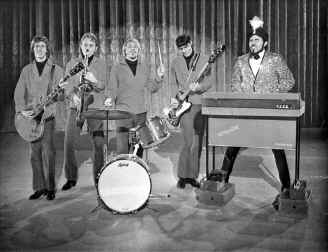
L-R: Ray Stinnett, Butch Gibson, Jerry Patterson, David Martin, Domingo Samudio
In June 1963, The Nightriders headed for Memphis, Tennessee, and became the house band at The Diplomat. In late summer 1963, Andy Anderson and Vincent Lopez left to return to Texas. Sam and bassist David A. Martin replaced them with drummer Jerry Patterson and guitarist Ray Stinnett and changed the band's name to Sam the Sham and the Pharaohs. Shortly thereafter, the band added saxophonist Butch Gibson.
|
|
After paying to record and press records to sell at gigs, Sam the Sham and the Pharaohs wound up with the XL label in Memphis. There they recorded their first and biggest hit, "Wooly Bully", in late 1964. Once MGM picked up the record, "Wooly Bully" ended up selling three million copies and reaching No. 2 on the Billboard Hot 100 on 5 June 1965, at a time when American pop music charts were dominated by the British Invasion. It was awarded a gold disc. Leonard Stogel was their manager.
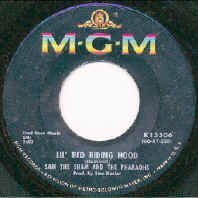
Although "Wooly Bully" never reached No. 1, it lingered on the Hot 100 for 18 weeks, the most weeks for any single within the calendar year 1965, 14 of which were in the top 40.
The Pharaohs' next releases – "Ju Ju Hand" (No. 26 US, Canadian No. 31) and "Ring Dang Doo" – were minor successes. In late 1965, 11 months after "Wooly Bully", David A. Martin, Jerry Patterson, Ray Stinnett, and Butch Gibson left over a financial dispute. Sam's manager, Leonard Stogel, discovered Tony Gee & The Gypsys at the Metropole Cafe in Times Square, New York City. The band were Tony "Butch" Gerace (bass guitar and vocals), Frankie Carabetta (keyboards, saxophone and vocals), Billy Bennett (drums and percussion), and Andy Kuha (guitar and vocals). This new set of Pharaohs recorded "Li'l Red Riding Hood". On the Hot 100, "Lil' Red Riding Hood" began its two-week peak at No. 2 the week of April 3, 1965.
|
|
|
In late 1966, three women, Fran Curcio, Lorraine Gennaro, and Jane Anderson, joined as The Shamettes. The group traveled to Asia as Sam the Sham & The Pharaohs and The Shamettes and released the album titled The Sam the Sham Revue. Sam also released a solo album in late 1967, titled Ten of Pentacles. In 1970, Sam went off on his own, and in 1971, issued an Atlantic album called Sam, Hard and Heavy, which won the Grammy Award for Best Album Notes in 1972. The album featured Duane Allman on guitar, the Dixie Flyers, and the Memphis Horns. He formed a new band in 1974. In the late 1970s, he worked with baritone saxophonist Joe Sunseri and his band, based in New Orleans. The early 1980s found Sam working with Ry Cooder and Freddy Fender on the soundtrack for the Jack Nicholson film The Border.
A series of mostly novelty tunes followed, all on the MGM label, keeping the group on the charts into 1967. Titles included "The Hair on My Chinny Chin Chin", "How Do You Catch a Girl", "I Couldn't Spell !!*@!", and "Oh That's Good, No That's Bad" .
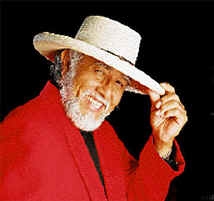
Domingo "Sam" Samudio 2011
After leaving the music business, Sam worked in Mexico as an interpreter and as a mate on small commercial boats in the Gulf of Mexico. Sam later became a motivational speaker and still makes occasional concert appearances. He was inducted into the Memphis Music Hall of Fame in 2016.
David Martin died August 2, 1987 from a heart attack, he was 50.